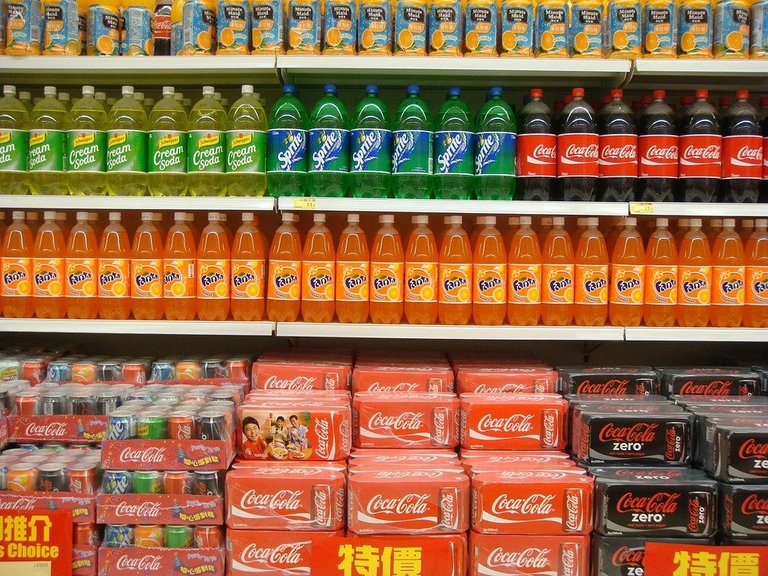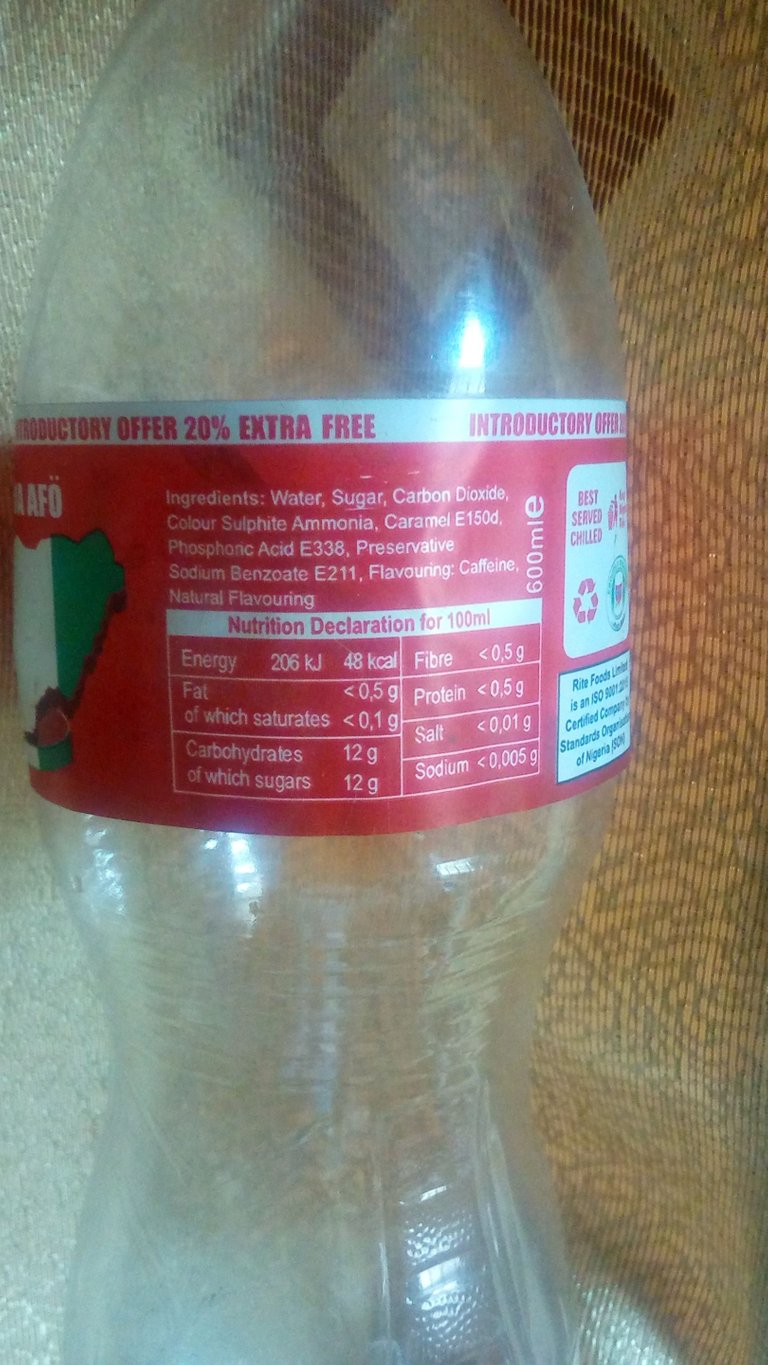If you belong to the type that does not take hard liquor, or distilled spirits, one of the alternatives to quench your thirst or enjoying a moment is to go for soft drink unless you like to act like a grandma and save little money, in that case ordinary cold water will do. This has become the norm and sure hypothesis in my environment for many years ago, in fact, majority of the populace prefer soft drink to hard liquor, and distilled spirits, come next to soft drink is cold water.
Yogurt, Juice and wine and some other drinks out there are among other costly drinks as such it is not commonly used to entertain a guest or consider for use during celebration, especially among majority of my people.
I can not vividly remember how many times I have denied myself from taking soft drinks, even when I have not deeply understand the defect in its contents as revealed by many researchers and medical practitioners. I used to detest it based on the fact that I don't like taking any food that is rich in sugar.

However, due to the unholy nature of hard liquor, and distilled spirits, soft drink is mostly used to entertain guest, either during a courtesy visit, celebration of any kind and to enjoy a pleasurable moment. To be fair, many people are not aware of the ill effect of soft drinks and those that were aware don't care about the consequences of not heeding to the warning as advised by the medical practitioners.
Soft drink Ingredients
Most notable soft drinks around here usually contain Water, Sugar, Carbon dioxide, Colour sulphite, Ammonia, Caramel E150d, Phosphoric Acid E338, Preservative, Sodium Benzoate E211, Carbonated Water, Flavouring: Caffeine, Natural Flavouring.
An empty sample of soft drink showing its ingredients is attached below for your attention

Water
Investigations carried out over time has revealed that most normal soft drinks contain up to 90 percent water, and 99 percent water presence in diet soft drinks. To prevent off-tastes due to the presence chlorine residues, producers always softened the water. Ion-exchange polymers, precipitation methods, reverse osmosis and sequestration using chelating agents are among the approaches usually used to remove the water hardness. While this may not have any significant effect due to water presence.
Phosphoric Acid
Soft drink contain Phosphoric Acid E338 as indicated above, it is deliberately added to soft drinks ingredients in order to get a sharper flavor. Phosphoric acid also cause many ions present in fruit juices to settle out as insoluble phosphates. Of course, phosphorus has also been refereed to as an important bone mineral. However, research has revealed that most of soda's acidity are usually emanates from phosphoric acid and a food rich in high phosphate has been associated with bone breakdown and an increased risk in osteoporosis (easy breaking down of bone either due to unexpected fall or even mild stresses).
Drinks like Cola has been proven to contain high level of phosphoric acid, also it has been linked to Kidney problems.
Sodium Benzoate E211
While Sodium benzoate may serves as preservative in soft drink just like it is also used in beverages and processed foods to increase the product's life expectancy, the effect of sodium benzoate in soft drinks has also been linked with Asthma.
Sugar
The presence of sugar in soft drink has been linked to the cause of tooth decay, because the presence of acid in sugar can dissolve tooth enamel.
Summary!
Heart disease, increased risk of Diabetes, reproductive issues, Obesity, Sugar overload, Kidney problems, Asthma, Tooth decay and erosion, osteoporosis,are all have been associated with ill effect of taking soft drinks. The ill effect is listed below
Heart disease
70% of cardiovascular disease is related to obesity. Heart disease has been confirmed to be the top killer in Malaysia. According to investigation, six (6) new cases of strokes occur in every hour in Malaysia.Increased risk of diabetes
Those who drink more soda are liable to have an 80% increased risk of developing type 2 diabetes.Reproductive issue
Bisphenol-A (BPA) used in lining of soft drink cans, can cause reproductive abnormalities.Obesity
Each additional daily serving of soda increase a child's risk for obesity by 60%.Sugar overload
A can of soft drink may contain 5-8 teaspoonfuls of sugar. 20 minutes after drinking a soft drink, your blood sugar shoots up, causing an insulin burst. Your liver responds to this by turning any sugar into fat.Kidney Problems
Colas contain high level of phosphoric acid which has been linked to kidney stories and other kidney problems.Asthma
A preservative like sodium benzoate has been linked to asthma.Tooth decay and erosion
Soft drinks contains sugar and carbonated water, research has revealed that both normal and diet carbonated soft drinks can affect one's teeth since there is presence of bacteria in mouth, this bacteria feed on sugar to produce chemicals that can destroy
the hard enamel of one'a teeth. The presence of the acid in carbonated soft drink has the potential to improve the chances of developing cavities. It is so since these chemicals produced by bacteria are known to slowly erode the enamel of one's teeth.Osteoporosis
Soft drink contains phosphoric acid and a high phosphate diet has been associated with bone break down and an increased in osteoporosis.
It always nice to see you around, especially to read your comment and interaction, however, I will like to know your sincere answer to the questions below:
- Which type of soft drink do you take when feeling thirsty?
- Which one do you take during celebration, be it birthday, wedding, family reunion, festive celebration? and finally
- To enjoy a moment, which type do you take?
References
1. Side Effects of Carbonated Drinks
2. “Lenny R. Vartanian, Marlene B. Schwartz and Kelly D. Brownell (2007). Effects of Soft Drink Consumption on Nutrition and Health: A Systematic Review and Meta-Analysis. American Journal of Public Health”.
3. What is Osteoporosis and What Causes It?
4. Phosphorus and Your Diet
5. What Is Sodium Benzoate? Everything You Need to Know
Is Phosphoric Acid Bad for Me?
6. Soda and Osteoporosis: Is There a Connection?
I hardly take soda anymore, so I am kind of indifferent to the different brands.
The sugar content of soda is too high. Consuming it more than a bottle everyday will pose several health risk. !discovery 20
This post was shared and voted inside the discord by the curators team of discovery-it
Join our community! hive-193212
Discovery-it is also a Witness, vote for us here
Delegate to us for passive income. Check our 80% fee-back Program
Thanks for your contribution to the STEMsocial community. Feel free to join us on discord to get to know the rest of us!
Please consider supporting our funding proposal, approving our witness (@stem.witness) or delegating to the @stemsocial account (for some ROI).
Please consider using the STEMsocial app app and including @stemsocial as a beneficiary to get a stronger support.